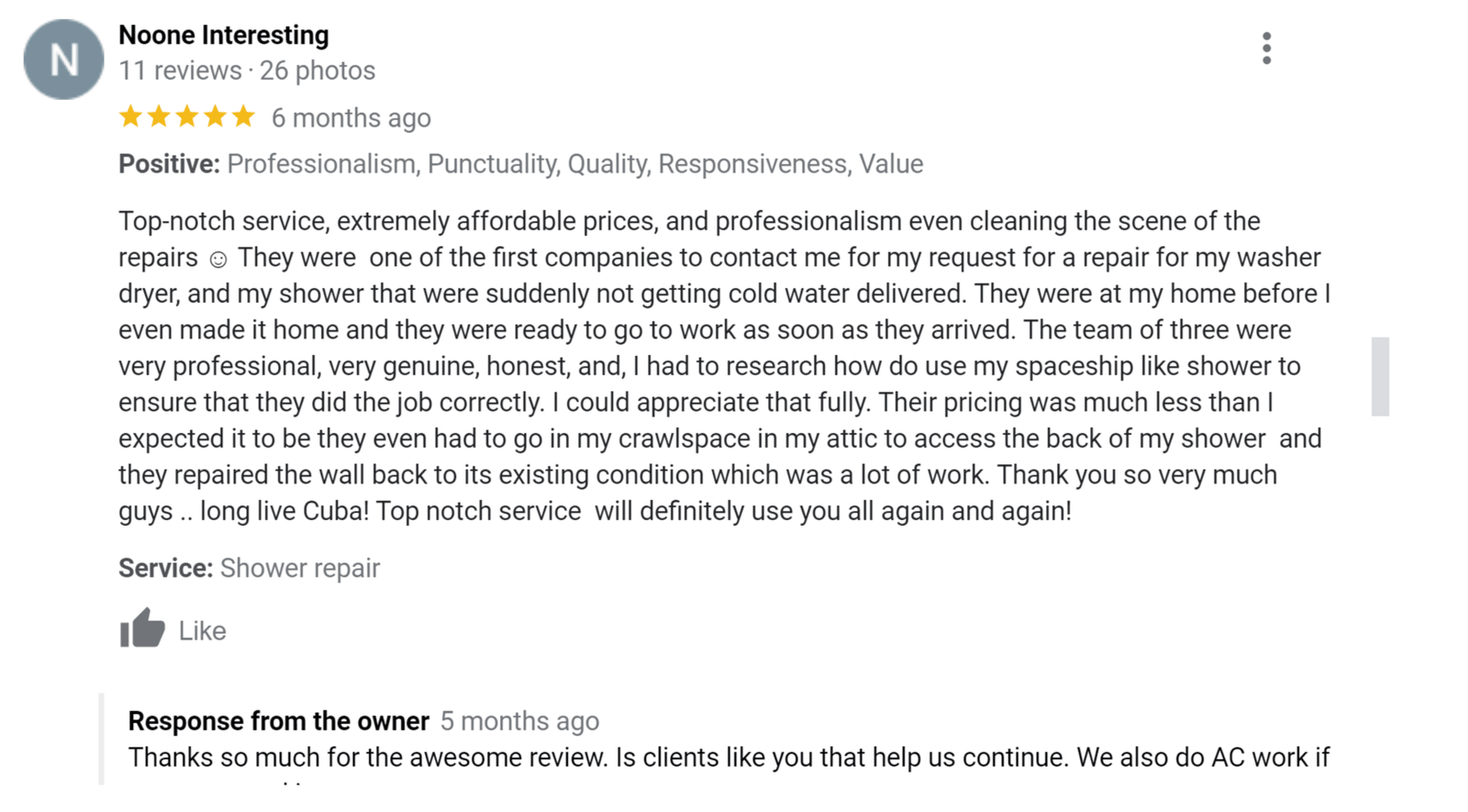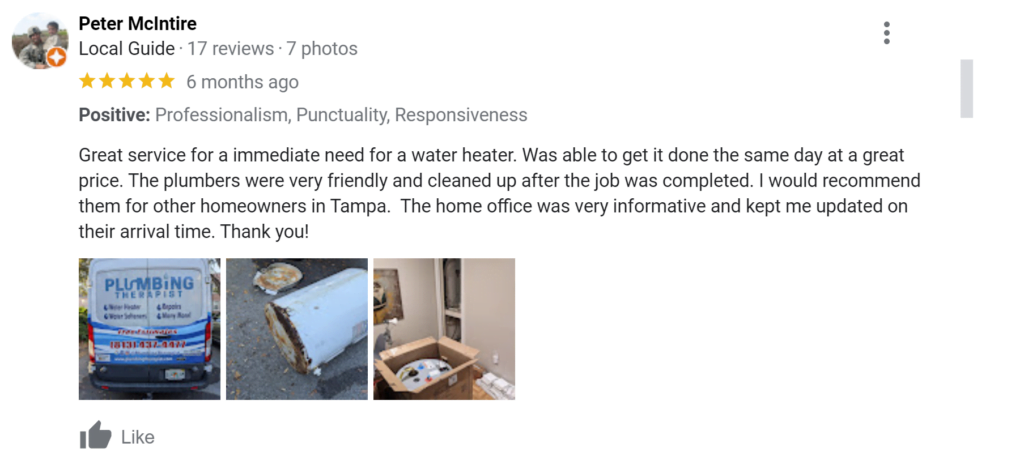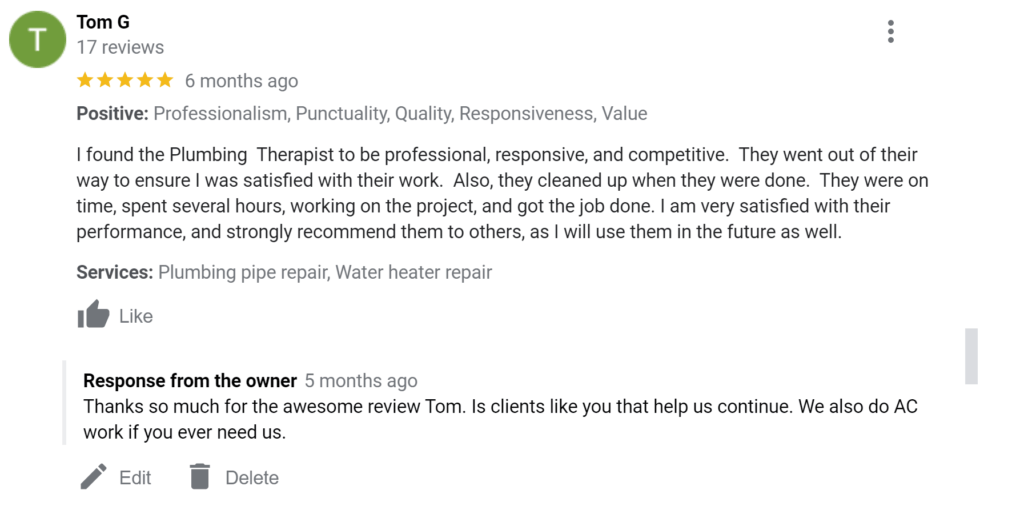Tankless Water Heater Maintenance
Regular tankless water heater maintenance ensures efficiency and longevity. Trust Plumbing Therapist for expert care in Tampa Bay!
Do You Need Our Help ?
Feel free to contact us now
$99 Water Heater Flush + Free Plumbing System Inspection
Tankless Water Heater Maintenance in Tampa Bay
Save Energy and Money with Tankless Water Heater Maintenance Services in Hillsborough County, Pinellas County, and Pasco County
Welcome to Plumbing Therapist, your trusted plumbing company in the Tampa Bay area. We understand the importance of efficient and cost-effective home solutions, and that’s why we’re here to discuss how tankless water heater maintenance can help you save both energy and money.
The Role of Maintenance
While tankless water heaters are known for their efficiency, they still require regular maintenance to function optimally. Neglecting maintenance can lead to a decrease in efficiency, higher energy consumption, and costly repairs down the line. At Plumbing Therapist, we offer comprehensive tankless water heater maintenance services tailored to your needs.
Our Tankless Water Heater Maintenance Services
Cleaning and Descaling: Over time, mineral deposits can build up in your tankless water heater, affecting its performance. Our expert technicians will clean and descale your unit to ensure efficient heat transfer and reduced energy consumption.
Inspection and Testing: We thoroughly inspect all components of your tankless water heater, checking for leaks, loose connections, and any signs of wear and tear. Our testing ensures that your unit operates at its peak efficiency.
Flushing: Regular flushing of the system removes sediment and debris, preventing clogs and maintaining optimal water flow and energy efficiency.
Replacing Faulty Parts: If we identify any worn-out or malfunctioning parts during our maintenance, we’ll replace them promptly to prevent more significant issues and ensure your heater’s energy-saving performance.
The Plumbing Therapist Advantage
By choosing Plumbing Therapist for your tankless water heater maintenance, you gain access to:
Expertise: Our experienced technicians are well-versed in the intricacies of tankless water heaters, ensuring the highest level of service.
Convenience: We offer flexible scheduling to fit your busy lifestyle, making maintenance hassle-free.
Cost Savings: Investing in regular maintenance can extend the lifespan of your tankless water heater and reduce energy consumption, ultimately saving you money in the long run.
Don’t wait until your energy bills skyrocket or your tankless water heater fails. Contact Plumbing Therapist today for professional tankless water heater maintenance in the Tampa Bay area. Save energy, save money, and enjoy the convenience of reliable hot water with our expert services. Your comfort and satisfaction are our top priorities.

Why partner with Plumbing Therapist?
Quality, Affordability, and Expertise.

No Hidden or Unexpected Charges

Free Estimates & Online Booking Available

Professionally Trained Technicians

Honesty is Guaranteed

Quick Communication & Service Within 24 Hours

400+ 5 Star Reviews

Why do you need a Tankless Water Heater Maintenance?
At Plumbing Therapist, we understand the importance of regular tankless water heater maintenance. Here are the key benefits of investing in this essential service:
Energy Efficiency: Tankless water heaters are known for their energy efficiency, but without proper maintenance, their performance can decline. Regular maintenance ensures that your unit operates at peak efficiency, reducing energy consumption and lowering your utility bills.
Extended Lifespan: Neglecting maintenance can lead to premature wear and tear on your tankless water heater. By addressing issues promptly through maintenance, you can extend the lifespan of your unit, protecting your investment.
Reliable Hot Water: Nothing is more frustrating than running out of hot water when you need it most. Maintenance helps prevent unexpected breakdowns, ensuring you always have a reliable supply of hot water.
Cost Savings: By maintaining your tankless water heater, you can avoid costly repairs that may result from neglected issues. Regular maintenance is a cost-effective way to prevent more significant problems down the road.
Improved Water Quality: Sediment buildup and mineral deposits can affect water quality. Our maintenance services include cleaning and descaling, improving the overall quality of the water flowing from your taps.
Environmentally Friendly: Using less energy to heat water not only saves you money but also reduces your carbon footprint. A well-maintained tankless water heater contributes to a greener, more sustainable home.
Peace of Mind: Knowing that your tankless water heater is in excellent condition provides peace of mind. You can trust that you’ll have hot water when you need it, without worrying about unexpected breakdowns.
Compliance with Warranty Requirements: Many manufacturers require regular maintenance to maintain the warranty on your tankless water heater. Our maintenance services ensure you stay compliant with warranty terms, protecting your investment further.
At Plumbing Therapist, we offer expert tankless water heater maintenance services tailored to your needs. Trust us to keep your tankless water heater running efficiently, saving you energy and money while ensuring your comfort and convenience.
If you would like more information, feel free to give them a call at (813)-437-4477 or you can book online and get their latest discount!
Customer Testimonials: Real Experiences with Plumbing Therapist
We proudly share the experiences and stories of our valued clients. Their feedback provides a glimpse into the quality of service and commitment to excellence we uphold at Plumbing Therapist. You'll read firsthand how our plumbing solutions have improved comfort and efficiency in homes across Tampa Bay. These testimonials illustrate our dedication to customer satisfaction and the difference our expert services can make.




Your questions answered
Common Tankless Water Heater Maintenance Questions:
How often should I have my tankless water heater serviced?
For optimal performance and to ensure the longevity of your tankless water heater, it’s generally recommended to have it serviced once a year. Regular annual maintenance helps keep your unit running efficiently and reduces the risk of unexpected breakdowns. During the service appointment, a professional plumber can clean and descale the unit, inspect all components, flush the system, and address any potential issues. However, the frequency of maintenance can also depend on the specific manufacturer’s recommendations and the local water quality in your area. It’s always a good practice to consult your tankless water heater’s manual or contact a professional plumber for guidance tailored to your system’s needs.
What does tankless water heater maintenance involve?
Tankless water heater maintenance involves several key tasks to ensure that the unit operates efficiently and reliably. Here are the typical maintenance steps for a tankless water heater:
Cleaning and Descaling: Over time, mineral deposits can build up on the heat exchanger and other internal components. Maintenance involves cleaning and descaling to remove these deposits, which can improve heat transfer and energy efficiency.
Inspection: A thorough inspection of all components is performed to check for signs of wear and tear, loose connections, or any potential issues. This step helps identify problems before they become major.
Flushing the System: Flushing the tankless water heater system helps remove sediment and debris that can accumulate in the water lines and the unit itself. Flushing ensures consistent water flow and prevents clogs.
Testing: The technician will test the unit’s functionality, including checking for leaks, verifying proper water temperature control, and ensuring that the unit operates as it should.
Replacing Worn-Out Parts: If any components are found to be worn out or malfunctioning during the inspection, they are replaced to prevent more significant problems in the future.
Adjustments: Sometimes, adjustments may be necessary to optimize the unit’s performance, such as adjusting the gas pressure or temperature settings.
Safety Checks: Safety is paramount. Technicians will ensure that all safety mechanisms are functioning correctly to prevent potential hazards.
Documentation: A record of the maintenance service is typically provided, which can be useful for warranty purposes or future reference.
It’s essential to have tankless water heater maintenance performed by a qualified professional. While some basic maintenance tasks can be done by homeowners, comprehensive maintenance requires expertise to ensure that the unit continues to operate safely and efficiently. Regular maintenance helps extend the lifespan of your tankless water heater, reduce energy consumption, and prevent costly repairs.
Can I perform maintenance on my tankless water heater myself?
While some basic maintenance tasks on a tankless water heater can be performed by homeowners, comprehensive maintenance and servicing are best left to qualified professionals. Here are some maintenance tasks you can consider doing yourself:
Flushing the System: Flushing your tankless water heater to remove sediment and debris is a task that some homeowners can undertake. Be sure to follow the manufacturer’s instructions in your owner’s manual.
Checking for Error Codes: Many tankless water heaters have error codes that can help diagnose issues. You can check the unit’s display for error codes and refer to the manual for guidance on what they mean.
Inspecting for Leaks: Regularly inspect the unit and the connections for any visible leaks. If you notice a leak, it’s best to turn off the unit and contact a professional for repair.
However, more complex maintenance tasks, such as cleaning the heat exchanger, descaling, adjusting gas pressure, or replacing worn-out parts, should be handled by experienced plumbers or technicians. Here’s why professional maintenance is recommended:
Safety: Tankless water heaters involve gas and electrical components, making them potentially dangerous if mishandled. Professionals are trained to work safely with these systems.
Expertise: Qualified technicians have the knowledge and experience to identify and address issues that might not be apparent to a homeowner. They can perform a thorough inspection and ensure all components are functioning correctly.
Warranty Considerations: Some manufacturers require professional maintenance to keep the warranty valid. Attempting DIY maintenance could potentially void the warranty.
Efficiency: Professionals have the tools and equipment necessary to clean and descale the unit effectively, improving its energy efficiency.
Preventative Maintenance: Professionals can proactively address potential problems before they escalate, reducing the risk of costly repairs.
In summary, while you can perform basic maintenance tasks, it’s advisable to have your tankless water heater professionally serviced at least once a year. This ensures that it continues to operate efficiently, reliably, and safely.
What are the signs that my tankless water heater needs maintenance?
Several signs can indicate that your tankless water heater may be in need of maintenance. Recognizing these signs early can help you address any issues before they become more significant problems. Here are common signs that your tankless water heater needs maintenance:
Reduced Hot Water Output: If you notice a decrease in the amount of hot water your tankless heater produces, it could be due to mineral buildup or other issues within the unit.
Fluctuating Water Temperature: Inconsistent water temperature, with hot water suddenly turning cold or vice versa during use, can indicate a problem with the unit’s heat exchanger or flow sensor.
Strange Noises: Unusual noises, such as popping, rattling, or banging sounds coming from the tankless water heater, may signal sediment buildup or other internal issues.
Error Codes: Many tankless water heaters have diagnostic error codes that appear on the unit’s display. These codes can provide valuable information about what’s wrong with the unit.
Leaking Water: Any visible water leakage around the unit or from the connections should be addressed promptly. Leaks can lead to more significant problems if left untreated.
Frequent Shutdowns: If the unit frequently shuts down or goes into “lockout” mode, it could be due to overheating, combustion issues, or other problems that require attention.
Longer Heating Times: If it takes longer than usual for hot water to reach your fixtures, it may be a sign of reduced efficiency in the unit.
Age of the Unit: If your tankless water heater is approaching or has surpassed its expected lifespan, it’s a good idea to schedule maintenance as part of regular upkeep.
Increased Energy Bills: A sudden spike in your energy bills without a corresponding increase in hot water usage could indicate reduced efficiency in the unit.
Lack of Regular Maintenance: If it’s been more than a year since your last maintenance appointment, it’s a good practice to schedule one, even if you haven’t noticed any specific issues.
If you observe any of these signs, it’s advisable to contact a professional plumber or technician to assess your tankless water heater. Regular maintenance can help address these issues, improve efficiency, and extend the lifespan of the unit.
How does maintenance affect energy efficiency?
Tankless water heater maintenance plays a crucial role in maintaining and improving energy efficiency. Here’s how regular maintenance can positively impact the energy efficiency of your tankless water heater:
Scaling and Mineral Deposits: Over time, minerals present in water, such as calcium and magnesium, can accumulate on the heat exchanger and other internal components of a tankless water heater. This buildup acts as insulation, making it harder for the heat exchanger to transfer heat to the water effectively. Maintenance involves descaling, which removes these deposits, ensuring efficient heat transfer and reducing energy consumption.
Cleaning: Dust, dirt, and debris can accumulate on the unit’s components, particularly the combustion chamber and fans. This buildup can hinder airflow and combustion, leading to inefficient heating. Maintenance includes cleaning these components, allowing for proper combustion and heat production.
Inspection and Repair: During maintenance, a technician inspects all components of the tankless water heater. Any worn-out or malfunctioning parts, such as sensors, valves, or electrical components, are identified and replaced. Replacing faulty parts ensures that the unit operates optimally, reducing energy waste.
Efficient Water Flow: Maintenance may include flushing the system to remove sediment and debris from the water lines. This improves water flow through the unit, reducing the time it takes to heat water and minimizing energy wastage.
Gas Pressure Adjustment: If the gas pressure is too high or too low, it can affect the unit’s combustion efficiency. During maintenance, the technician can adjust the gas pressure to ensure it is within the manufacturer’s recommended range for efficient operation.
Temperature Settings: Maintenance may also involve checking and calibrating the unit’s temperature settings. Correct temperature settings ensure that the unit does not overheat water unnecessarily, conserving energy.
Safety Checks: Ensuring that safety mechanisms, such as pressure relief valves and venting systems, are functioning correctly helps prevent energy inefficiencies and potential hazards.
Long-Term Efficiency: Regular maintenance helps prevent the gradual decline in efficiency that can occur over time due to wear and tear. By addressing issues promptly, maintenance helps maintain the unit’s original efficiency levels.
In summary, tankless water heater maintenance addresses factors that can hinder energy efficiency, such as scaling, dirt, faulty components, and inefficient combustion. By removing these obstacles and ensuring the unit operates optimally, maintenance helps your tankless water heater use less energy to provide the same amount of hot water, resulting in lower energy bills and reduced environmental impact.
Is tankless water heater maintenance different from traditional tank-style water heater maintenance?
Yes, tankless water heater maintenance is different from traditional tank-style water heater maintenance due to the distinct design and operation of these two types of water heaters. Here are some key differences:
1. No Storage Tank vs. Storage Tank:
- Tankless Water Heater: Tankless units heat water on-demand, without storing hot water in a tank. They use heat exchangers to quickly heat water as it passes through.
- Traditional Tank-Style Water Heater: Tank-style water heaters store a large volume of hot water in a tank and continually maintain it at a set temperature.
2. Maintenance Frequency:
- Tankless Water Heater: Tankless units typically require annual maintenance to prevent scaling and ensure efficient operation.
- Traditional Tank-Style Water Heater: Tank-style heaters also benefit from annual maintenance, but the tasks involved are different due to the presence of a storage tank.
3. Cleaning and Descaling:
- Tankless Water Heater: Maintenance for tankless units often includes cleaning and descaling to remove mineral deposits from the heat exchanger and other components.
- Traditional Tank-Style Water Heater: Tank-style heaters may require occasional flushing to remove sediment buildup from the bottom of the tank.
4. Inspection and Testing:
- Tankless Water Heater: Technicians inspect components specific to tankless units, such as sensors, heat exchangers, and combustion systems. They also test for proper flow and temperature control.
- Traditional Tank-Style Water Heater: Inspections for tank-style heaters focus on the tank itself, checking for signs of corrosion, leaks, and the condition of the sacrificial anode rod.
5. Venting and Combustion:
- Tankless Water Heater: Maintenance may include inspecting venting systems and combustion components to ensure efficient and safe operation.
- Traditional Tank-Style Water Heater: Tank-style heaters have combustion chambers and venting systems, but their maintenance focuses on different aspects compared to tankless units.
6. Different Components:
- Tankless Water Heater: Maintenance involves components like flow sensors, heat exchangers, and gas burners specific to tankless systems.
- Traditional Tank-Style Water Heater: Maintenance for tank-style heaters includes checking the tank, relief valves, and the anode rod.
In summary, while both tankless and tank-style water heaters benefit from regular maintenance, the tasks involved are tailored to the unique design and operation of each type. It’s essential to follow manufacturer guidelines and consult with a professional plumber or technician who is experienced with your specific type of water heater to ensure proper maintenance and efficient, trouble-free operation.

